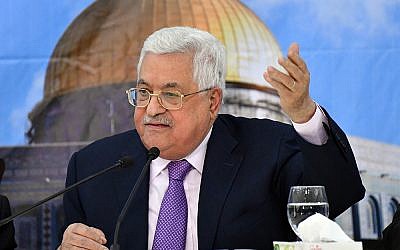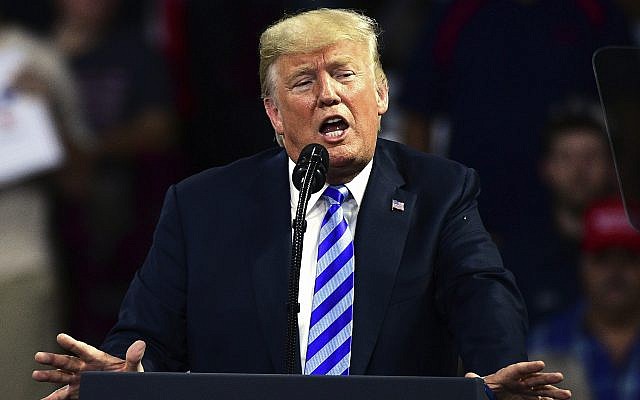Trump: Israel will pay ‘higher price’ in peace talks after embassy move
US president says recognition of Jerusalem will help negotiations: ‘Palestinians will get something very good, because it’s their turn next’
US President Donald Trump said Tuesday night Israel will pay “a higher price” in peace talks with the Palestinians due to his decision to recognize Jerusalem as the Jewish state’s capital.
Speaking at a campaign rally in Charleston, West Virginia, Trump said Palestinians “will get something very good” in any future negotiations.
“If there’s ever going to be peace with the Palestinians, then this was a good thing to have done,” Trump said of the recognition of Jerusalem and the relocation of the US embassy to the capital.
“We took it off the table. In past negotiations, they never got past Jerusalem. Now Israel will have to pay a higher price, because it’s off the table. The Palestinians will get something very good, because it’s their turn next.”
The president’s statements echoed ones he has made in the past. Speaking alongside Prime Minister Benjamin Netanyahu earlier this year in Switzerland, Trump said “They never got past Jerusalem. We took it off the table. We don’t have to talk about it anymore.”

He noted to the Israeli leader then: “You won one point, and you’ll give up some other points later on in the negotiation — if it ever takes place.”
In May Israeli Defense Minister Avigdor Liberman also acknowledged that Israel would likely pay “a price” for the embassy move, explaining, “There is no free lunch.” But, he added, “it is worth paying it. We should welcome, and be prepared, to pay a price.”
The Trump administration said last week that neither Israelis nor Palestinian would be “fully pleased” with its long-awaited Middle East peace plan, whose contents are one of the most guarded secrets in Washington.
Jason Greenblatt, Trump’s special representative for international negotiations, tweeted a statement from multiple officials that said the only way to achieve a final-status accord was for both parties to accept painful compromises.

“No one will be fully pleased with our proposal, but that’s the way it must be if real peace is to be achieved,” the officials said. “Peace can only succeed if it is based on realities.”
The quote was attributed to US Ambassador to the United Nations Nikki Haley, US Ambassador to Israel David Friedman, White House Senior Adviser Jared Kushner and Greenblatt.
Trump officials have said they are finishing the plan and working on rolling it out, but have not offered any timeline.
Even before the release of the plan, the Palestinian Authority, which is boycotting the administration, has rejected the attempt to jump-start talks.
The Palestinian leader’s frustration with the White House dates back to last December, when Trump formally recognized Jerusalem as Israel’s capital and set in motion plans to move the US embassy there from Tel Aviv. The new compound was eventually opened in May.


